PULSE
Advancing Cures and Developing the Next Generation of Lymphoma Researchers
When she was a child in Italy, Laura Pasqualucci, MD, liked to go to the emergency clinic with her father, where both the intellectual complexity and the humanitarian aspects of medicine drew her in. page 8
Updates From 2023 American Society of Hematology Annual Meeting page 16
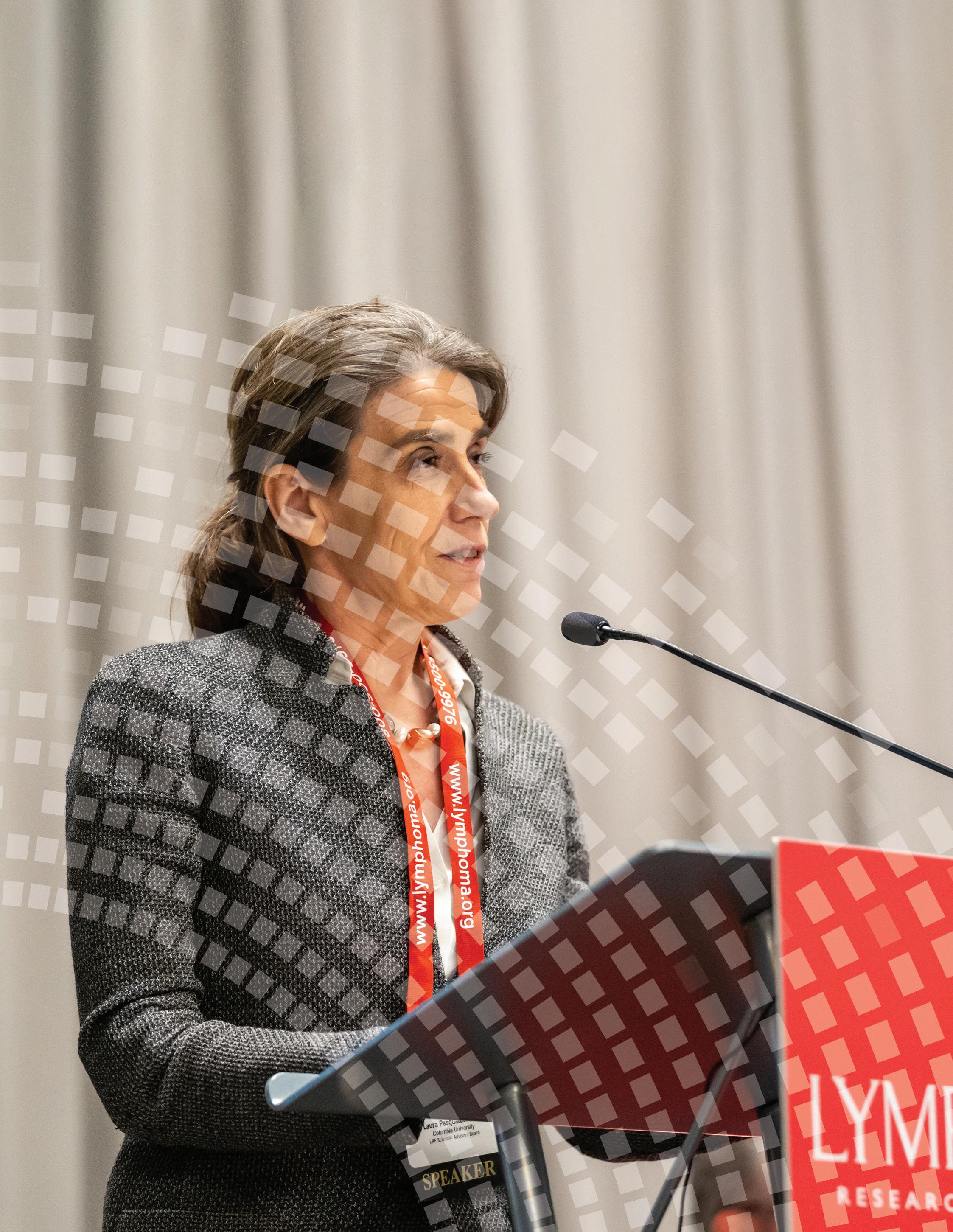

Winter 2024 A Publication for Friends of the Lymphoma Research Foundation
PULSE
A Publication for Friends of the Lymphoma Research Foundation
Pulse is a publication of the Lymphoma Research Foundation, providing the latest updates on the Foundation and its focus on lymphoma research, awareness, and education.
The Lymphoma Research Foundation is devoted to funding innovative lymphoma research and serving the lymphoma community through a comprehensive series of education programs, outreach initiatives, and patient services.
FOUNDATION LEADERSHIP
Steven Eichberg
Chair, Board of Directors
Ann S. LaCacse, MD, MMSc Chair, Scientific Advisory Board
Meghan E. Gutierrez Chief Executive Officer
Editor
Nichole Musumeci
Associate Editor
Paige Butler
Editorial Board
Micah Banner
Jesse Brown
Victor Gonzalez
Kyle Haines
Fatima Hameed
Eva Migliore
Sarah Quinlan
Whitney Steen
Laura Wallenstein

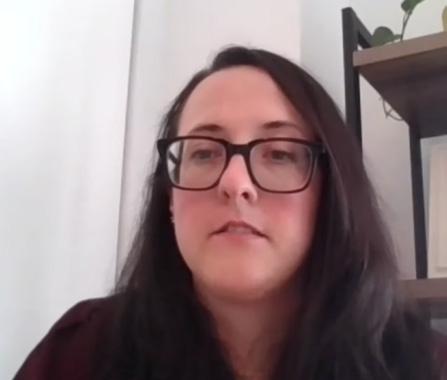


CONTACT US
National Headquarters Wall Street Plaza
88 Pine Street, Suite 2400 New York, NY 10005
Tel: 212 349 2910 lymphoma.org
LRF Helpline
800 500 9976 helpline@lymphoma.org
Contact the Editor
For more information or to share comments, please email editor@lymphoma.org.
LYMPHOMA RESEARCH FOUNDATION’S YOUTUBE CHANNEL

The Lymphoma Research Foundation’s YouTube channel offers a wide variety of educational videos to help the lymphoma community learn about lymphoma. These videos provide disease-specific information as well as education regarding diagnosis, treatment options, clinical trials, and other resources for people dealing with a lymphoma diagnosis.
Visit YouTube.com/c/LymphomaResearch to watch and subscribe.
PULSE | WINTER EDITION 2024
Pulse © 2024 Lymphoma Research Foundation
Advancing Cures and Developing the Next Generation of Lymphoma Researchers
When she was a child in Italy, Laura Pasqualucci, MD, liked to go to the emergency clinic with her father, where both the intellectual complexity and the humanitarian aspects of medicine drew her in.
Updates From 2023 American Society of Hematology Annual Meeting
LRF returned to the American Society of Hematology (ASH) Annual Meeting and Exposition with more than 300 LRF-affiliated scientists contributing to an abstract presented at the conference.
Celebrating the Original “Chemo Diva”
How Tatiana Tate honors her mother’s lymphoma journey by supporting other women of color facing a cancer diagnosis.
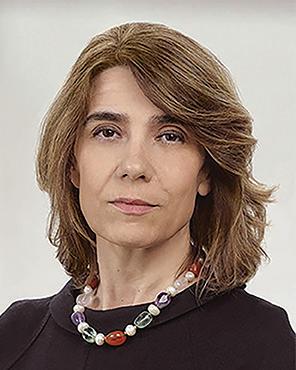

[ DEPARTMENTS ] Community Impact Philanthropy in Action Morton Coleman, MD Innovation Fund 4 From the Field Where Are They Now? 12 TABLE OF CONTENTS [ FEATURES ]
8
16
24 1
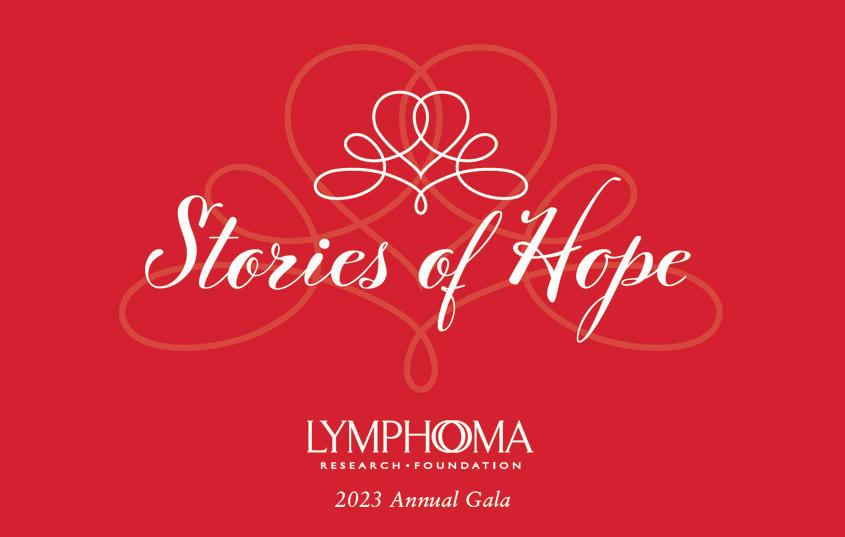
LRF ANNUAL GALA
Thank you to the generous sponsors and supporters listed below and to our many other donors who helped to contribute to the success of the 2023 Annual Gala, which helped to raise almost $1.1 million to support the Lymphoma Research Foundation’s (LRF) mission of eradicating lymphoma and serving those touched by the disease.
PRESENTING
Genmab
CHAMPION
Pharmacyclics LLC, an AbbVie Company and Jansen Biotech, administered by Janssen Scientific Affairs
LEADER
The Hoffman Family
Kite, A Gilead Company
Lilly Oncology
Leigh & Cory Olson
Regeneron
Seagen
Susan & Jeffrey Sussman
The Werner Family
ADVOCATE
BeiGene
The Prince Family Foundation
ONLINE AUCTION
Harriet & Scott Greenberg
LRF is delighted to announce the 2024 Annual Gala taking place Wednesday, September 25, 2024, at the Ziegfeld Ballroom in New York City. If you are interested in pledging your 2024 support early or would like to be added to our list to be the first to hear about our event details, please reach out to the Events Team at events@lymphoma.org.
lymphoma.org/gala

FROM THE CEO
The Lymphoma Research Foundation (LRF) is defined by its tireless commitment to our mission: eradicating lymphoma and serving those who have been touched by this disease. With each breakthrough we are one step closer to reaching these goals.
In this issue of Pulse, we profile one of the innovative leaders responsible for such breakthroughs, Laura Pasqualucci, MD, Professor of Pathology and Cell Biology at the Institute for Cancer Genetics at Columbia University and a member of the Foundation’s prestigious Scientific Advisory Board (SAB). Dr. Pasqualucci’s interest in medicine began during her childhood in Italy, watching her father work as a physician. Now, she is creating a brighter road ahead for patients and researchers alike through her groundbreaking work studying lymphoma mutations and through her leadership as a mentor in LRF’s Lymphoma Scientific Research Mentoring Program (LSRMP).

You’ll also read about Tatiana, whose world was turned upside down when her mother, Paulette, was diagnosed with adult T-cell lymphoma at age 48. As she cared for her mother through chemotherapy, radiation, and immunotherapy, she struggled to find stories of cancer patients and caregivers that she could relate to as a woman of color. Out of this struggle she founded Chemo Divas, a nonprofit foundation dedicated to sharing the experiences of women of color who’ve been diagnosed with cancer and improving health equity by providing resources and financial support to this historically underserved community.
Lastly, you will read about the Foundation’s impact at the 2023 American Society of Hematology Annual Meeting & Exposition. Over 300 LRF-affiliated scientists contributed to an abstract presented at this year’s conference, the world’s premier event in hematology. Their findings and discoveries will be critical to developing new treatments and deepened understanding of lymphomas across the entire spectrum of subtypes and patient populations.
We are profoundly grateful for your unwavering commitment to LRF’s mission. Your support, together with the expert leadership of our Scientific Advisory Board and the dedication of our researchers, brings us closer and closer each day to our shared vision: a world without lymphoma.
Sincerely yours,
 Meghan Gutierrez Chief Executive Officer
Meghan Gutierrez Chief Executive Officer
3
PHILANTHROPY IN ACTION

LRF DONORS RAISE OVER $230,000 TO SUPPORT LYMPHOMA PATIENTS AND RESEARCHERS
Our community of dedicated supporters didn’t let 2023 end without showing their commitment to LRF’s mission. LRF donors raised over $23,000 during Giving Tuesday 2023, an annual global day of giving on the Tuesday after Thanksgiving encouraging everyone to give to organizations whose mission is making an impact. LRF supporters didn’t limit their generosity to Giving Tuesday alone – they also raised over $215,000 during our end-of-year giving campaign, giving us so much to be grateful for as we rang in 2024.

DISNEYLAND HALF MARATHON RAISES OVER $17,000
Team LRF spent a weekend at the happiest place on earth when they joined thousands of runners at the 2024 Disneyland Half Marathon Weekend in Anaheim, California. The event kicked off with the Pluto 5K race on January 12, followed by the Donald & Daisy 10K race on January 13, and culminating in the Mickey Mouse & Minnie Mouse Half Marathon on January 14. Seventeen runners represented LRF at this event for the very first time, raising over $17,000 to fund the future of lymphoma research.
[ COMMUNITY IMPACT ]
PULSE | WINTER EDITION 2024
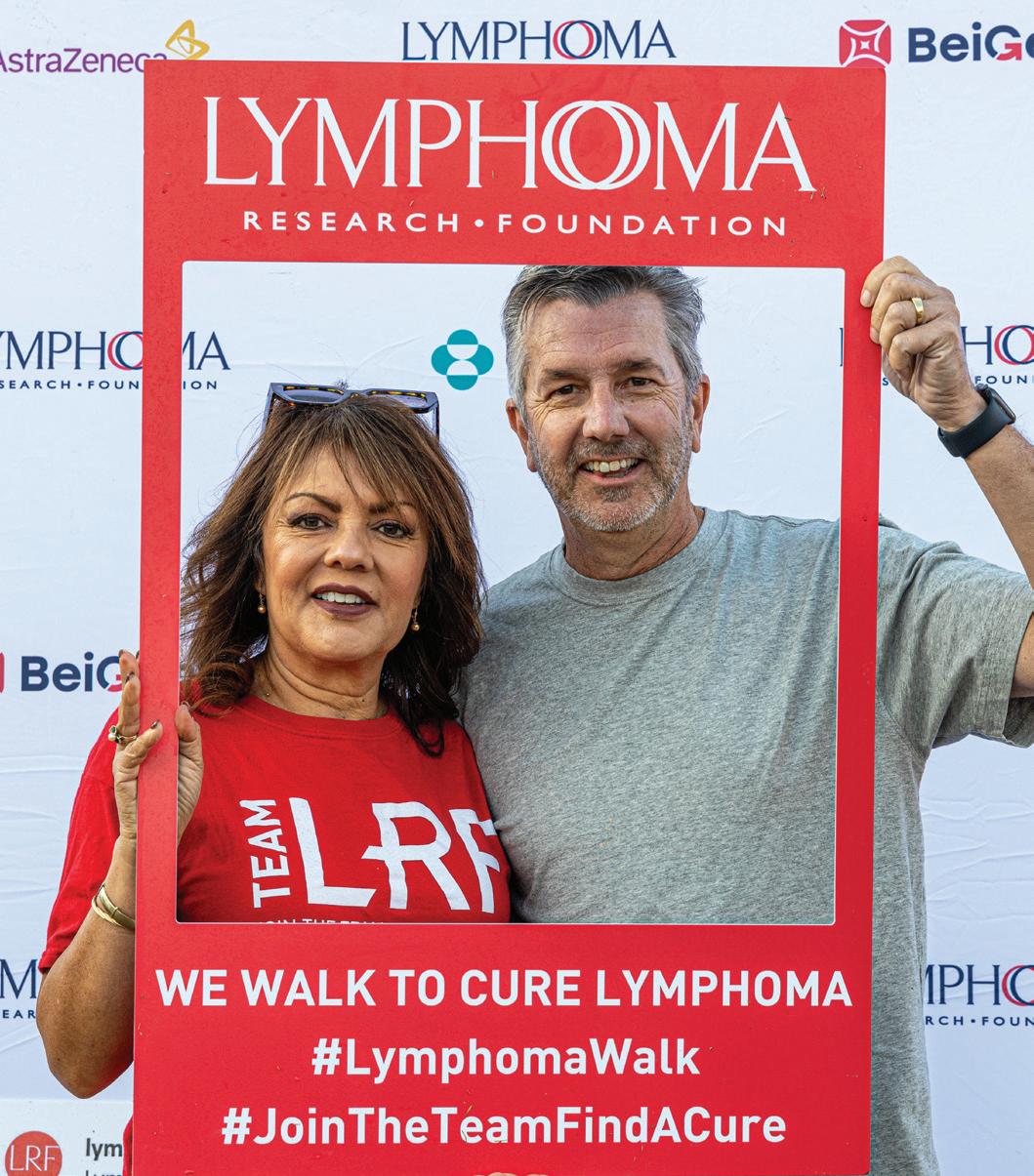

2023 ARIZONA LYMPHOMA WALK RAISES NEARLY $20,000
LRF’s 2023 Arizona Lymphoma Walk was held on November 4 at the Phoenix Zoo, raising nearly $20,000 in support of the lymphoma community. Honored at this year’s walk was Connie Brewster, who received the Lee Grubman Caregiver of the Year Award, and Linda Allen and her team, Memory of Max Allen, who received the Top Team of the Year Award. Over 250 participants turned out for this year’s walk, getting us one step closer to a future free of lymphoma.
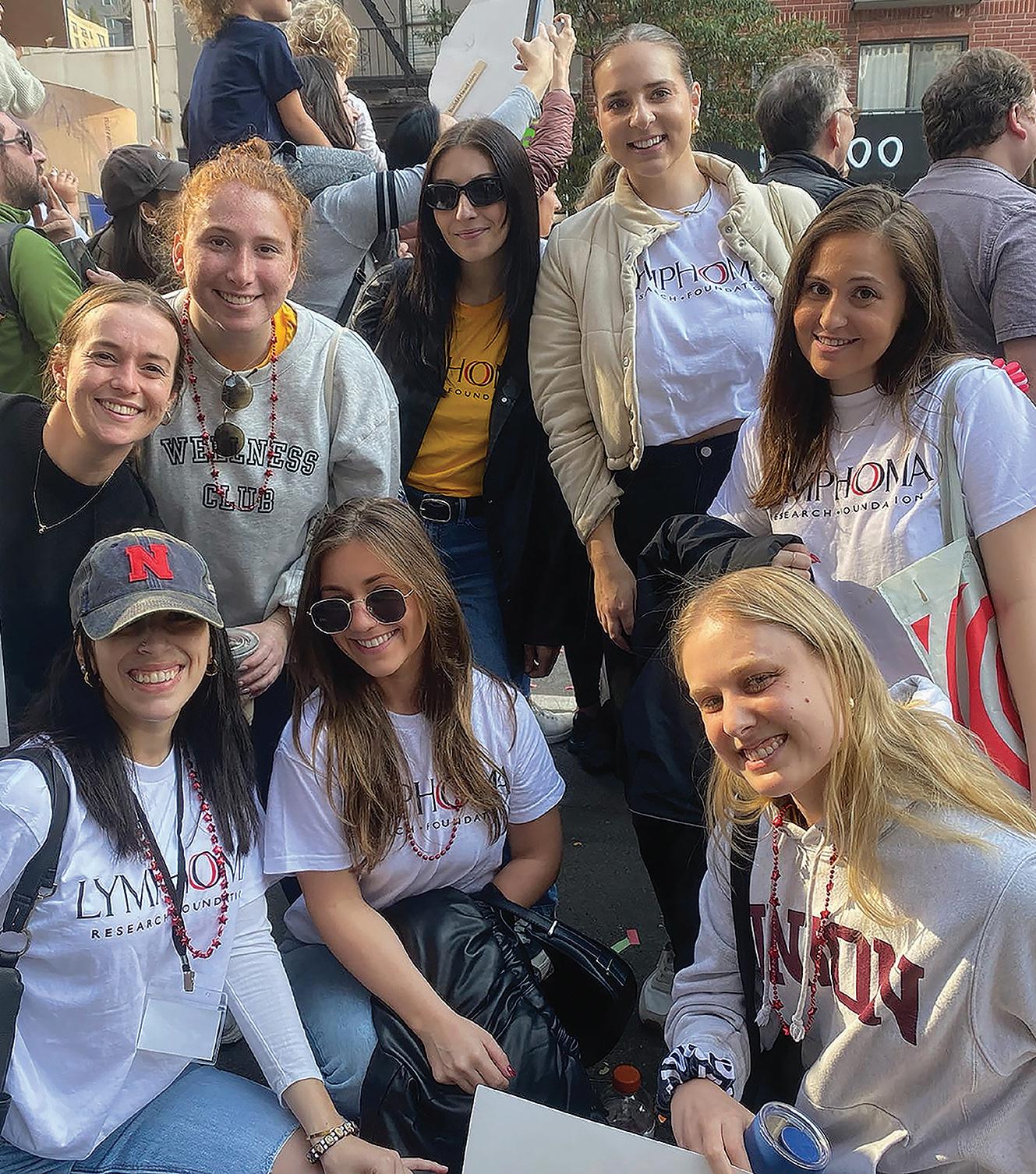
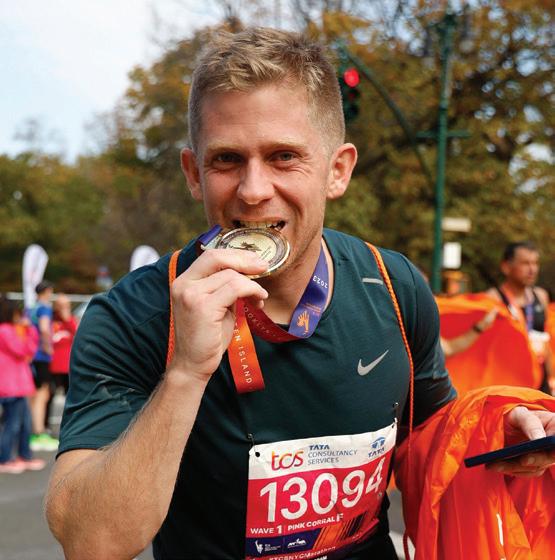
TEAM LRF RAISES OVER $25,000 AT THE 2023 TCS NEW YORK CITY MARATHON
On Sunday, November 5, over 50,000 runners took to the streets of New York City for 2023’s largest marathon – including Team LRF! Ten marathoners ran 26.2 miles through NYC’s five boroughs in support of LRF’s lifesaving mission, raising over $25,000 to power critical lymphoma research and patient support services. The runners were joined by LRF volunteers who cheered them on throughout the route on the sidelines.
5
MORTON COLEMAN, MD INNOVATION FUND
Dr. Morton Coleman is a world-renowned and highly respected medical oncologist with nearly 60 years of experience in the field, specializing in the treatment of patients with lymphoma, multiple myeloma, and leukemia.
In 2023, the Lymphoma Research Foundation (LRF) announced the Morton Coleman, MD Innovation Fund in recognition of Dr. Coleman’s many accomplishments and contributions to the field of lymphoma/chronic lymphocytic leukemia (CLL) research and patient care. The Foundation’s goal is to respond to challenges facing the lymphoma community and to make significant advances in biomedical research in congruency with Dr. Coleman’s pursuit of cures and dedication to his patients.
The money raised will go toward areas of planned scientific focus, such as supporting translational science and clinical trials. Bringing these advances directly to patients through novel education programs and support services will serve hundreds of thousands of people every year. Each area will require the Foundation to leverage significant expertise and resources and allow it to build upon the important work and achievements of experts like Dr. Coleman.
[ COMMUNITY IMPACT ]
PULSE | WINTER EDITION 2024
One of Dr. Coleman’s several grateful patients Sara Weinstein was thrilled for the opportunity to support a fund in his honor saying, “He is one of God’s angels.” Weinstein shared that when she was diagnosed with lymphoma, she was most fearful of sitting in a chemo treatment center amongst so many other cancer patients. However, she says that Dr. Coleman’s attentive, calm, and reassuring nature helped to normalize the process of having cancer and created a sense of community that eased her concerns. “Dr. Coleman was extremely attentive and helped me retain my sense of normalcy. When I told him that I wanted to be able to work whilst receiving treatment, he arranged for me to have my own office at the hospital where I could receive treatment and continue to work,” says Weinstein. “He quite literally saved my life, and I will forever be filled with gratitude to him!”

“He quite literally saved my life, and I will forever be filled with gratitude to him!”
Throughout his two decades of service to LRF, Dr. Coleman served as the Founding Chair of LRF’s Medical Affiliates Board, was instrumental in establishing a global Marginal Zone Lymphoma effort, and founded Lymphoma Rounds, a first-of-its-kind continuing medical education program for oncologists. Dr. Coleman also provided invaluable support to hopeful young oncologists as a mentor through the LRF Lymphoma Scientific Research Mentoring Program.
This new fund will honor his legacy and ensure that LRF can continue to serve as a hub for science and service to the entire lymphoma community.
The Foundation would like to thank the donors whose philanthropic support is making the Morton Coleman,
Fund possible.
DR. MORTON COLEMAN
Innovation
accepted. Contact Lynne Winter at lwinter@lymphoma.org to learn more.
MD
Gifts are still being
7
ADVANCING CURES AND DEVELOPING
THE NEXT GENERATION OF LYMPHOMA RESEARCHERS
Growing up in Spoleto, Italy, Laura Pasqualucci, MD, loved classical music. While her appreciation for music led her to attend a conservatory to study the art form, it was ultimately her adoration for medicine that inspired her to dedicate her career to studying pathology. As a child, Pasqualucci visited the emergency clinic where her father worked, and the intellectual complexity and humanitarian aspects of medicine drew her in. Medicine runs deep in Pasqualucci’s family. Her father was a physician, her mother a pharmacist, and several family members were doctors as well.


PULSE | WINTER EDITION 2024
[ FROM THE FIELD ]
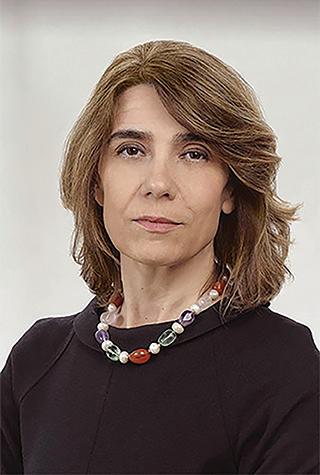
Encouraged by her family to pursue whatever interested her, medicine or not, Pasqualucci gravitated toward clinical medicine, nonetheless, and completed her residency in hematology at the University of Perugia Medical School in Italy. Pasqualucci was drawn to the pathology of this physiological system and was especially interested in the events that initiate disease and in understanding why certain patients respond to therapy while others don’t.
At the same time, this field provided rich patient contact and the ability to be there to support people who are coping with a diagnosis that can be challenging to face. In 1997, Dr. Pasqualucci received a fellowship to conduct research abroad from the Italian Association for Cancer Research, which brought her to New York. Since then, she has worked as a researcher and professor.
Transitioning to Basic Research
While she misses seeing patients, she has thrown her considerable intellect and experience into research and currently works on critical projects in the study of diffuse large B cell lymphoma (DLBCL) and follicular lymphoma, the two most common lymphoma diagnoses, as Professor of Pathology & Cell Biology in the Institute for Cancer Genetics at Columbia University. She also serves on LRF’s Scientific Advisory Board (SAB) where she helps the Foundation seek out the most innovative and promising lymphoma research projects for support. Additionally, Dr. Pasqualucci is passionate about helping to mentor the
“
Every three minutes somebody in the U.S. is diagnosed with a form of blood cancer. There are still several unmet clinical needs, and I am passionate about helping to fill those gaps”
next generation of basic and translational researchers and has done so through LRF’s Lymphoma Scientific Research Mentoring Program – a first-of-its-kind program for junior scientists focused on lymphoma and CLL research.
When Dr Pasqualucci first entered the lymphoma research field in 1997, she was both excited and a bit intimidated. The culture of lab work is different from clinical practice. She had a lot of knowledge to catch up on but says she was happy to do the work. Dr. Pasqualucci is keen to remind prospective researchers who may lack a lot of lab experience that they can make the change, too. “If you have passion and curiosity, you can catch up very quickly,” she says.
As a researcher, core aspects of malignant hematology appeal to Dr Pasqualucci. The easy access to tissues to work with – blood cells – means there’s a rich environment for interrogating the deep roots of the disease and gaining insights on what drove these cells to become malignant. She also adds that the increasing success rate of new treatments is gratifying, and she is inspired by the prospect of her research continuing to provide the basis for improving patient outcomes.
“Every three minutes somebody in the U.S. is diagnosed with a form of blood cancer. There are still several unmet clinical needs, and my main goal is helping to fill those gaps.”
Continued on the next page
9
Harnessing the Immune System
Dr Pasqualucci’s initial work involved the study of normal germinal center B cells, a specialized lymphocyte population that is crucial for the body to achieve effective immune responses against foreign pathogens. Germinal center B cells are essential to the immune system, as they can modify their antibody genes through the process of somatic hypermutation and, by doing so, increase the specificity of the antibodies for the foreign pathogen. Only a few cells that succeed in this process are ultimately selected to exit the germinal center and fight off pathogens by secreting antibodies. When this process goes awry, however, it can lead to cancer.
“This difficult work is clearly worth the effort,” says Dr. Pasqualucci.
When she joined the laboratory of Dr. Dalla-Favera in New York (also a past member of the LRF SAB), Pasqualucci discovered that hypermutation can affect other genes beyond the antibody genes, and that this process malfunctions in lymphoma, leading to the aberrant targeting of multiple genes. This key finding opened new paths for investigation into how mutations can contribute to the development of lymphomas, and it remained a major interest in her research. Indeed, a joint effort with Dr. Dalla-Favera, who remained a main collaborator in the genetics of B cell lymphoma, led to the discovery that this mechanism targets specifically the non-coding regions of these tumors’ DNA. Non-coding regions don’t produce proteins but are essential for regulating gene activity. They are also particularly challenging to study.
Dr. Pasqualucci’s work has led to mapping out mutations across the entire genome and a better understanding of how these mutations can deregulate other key genes. This discovery has revealed new disease drivers that could serve as targets for therapy and new areas of investigation in lymphoma research more broadly. Among the genes hijacked by germinal center-derived lymphomas, Pasqualucci found several “epigenetic modifier genes.” These genes are like the conductors of an orchestra, who don’t play an instrument themselves but tell other genes when to start and when to stop playing or instruct them to play louder or to remain silent, therefore, changing the overall symphony of the cell without changing the notes. The ultimate goal is to identify vulnerabilities of the cancer cell that could be leveraged for more effective, less toxic treatments. Pasqualucci and her colleagues are working to better understand how cancer cells can manipulate their environment to avoid immune system interference.
Dr. Pasqualucci notes that it is important that we work on a comprehensive understanding of lymphoma cells, their microenvironment, the epigenetic factors beyond the DNA sequence that influence gene expression, and also the patients’ own genetic makeup. Having a complete picture of cancer development helps us develop more effective therapies.
Patients are Always Top of Mind
Dr. Pasqualucci is always aware of the real-time link between her work and patients.
She would like patients to know that they can contribute to the field of lymphoma research by participating in correlative studies during trials and by consenting to the use of biosamples, especially tissues that might otherwise be discarded.
“There are still patients who do not respond to current approaches, and there are diseases where cure rates are very low. We need to understand the heterogeneity of this cancer.”
“There are still patients who do not respond to current approaches, and there are lymphoma types where cure rates are very low. We need to understand the heterogeneity of this cancer,” she said. “This community is relatively small, but it’s critical that we advocate for them.”
Pasqualucci remains deeply involved with LRF due, in part, to its tight focus. “LRF is a particularly unique organization because of its Scientific Advisory Board and review process. It’s all experts in lymphoma, so it’s different from many other foundations.”
One of Dr Pasqualucci’s non-research projects is to increase the number of researchers studying lymphomas. “LRF is a phenomenal venue to identify important new areas of research – and up-and-coming researchers,” she said. “LRF’s mentorship program is valuable to new researchers because it exposes them to key aspects that may not be addressed during their training. The program also gives young researchers an opportunity to meet and work with leaders in the lymphoma field, which can be invaluable to their career growth.”
[ FROM THE FIELD ]
PULSE | WINTER EDITION 2024
LYMPHOMA ROUNDS
2024 SERIES
Free CME Program for Professionals
The Lymphoma Research Foundation’s (LRF) Lymphoma Rounds program provides a series of accredited CME activities that provide a forum for local healthcare professionals to meet on a regular basis and address issues specific to the diagnosis and treatment of their lymphoma patients.
Participants share best practices and learn the latest information on new therapies and advances in the management of lymphoma through interactive case studies presented by lymphoma experts.
2024 LYMPHOMA ROUNDS SCHEDULE
Spring 2024
3/6 – San Francisco Lymphoma Rounds
3/21 – Philadelphia Lymphoma Rounds
3/28 – Chicago Lymphoma Rounds
4/11 – New England Lymphoma Rounds
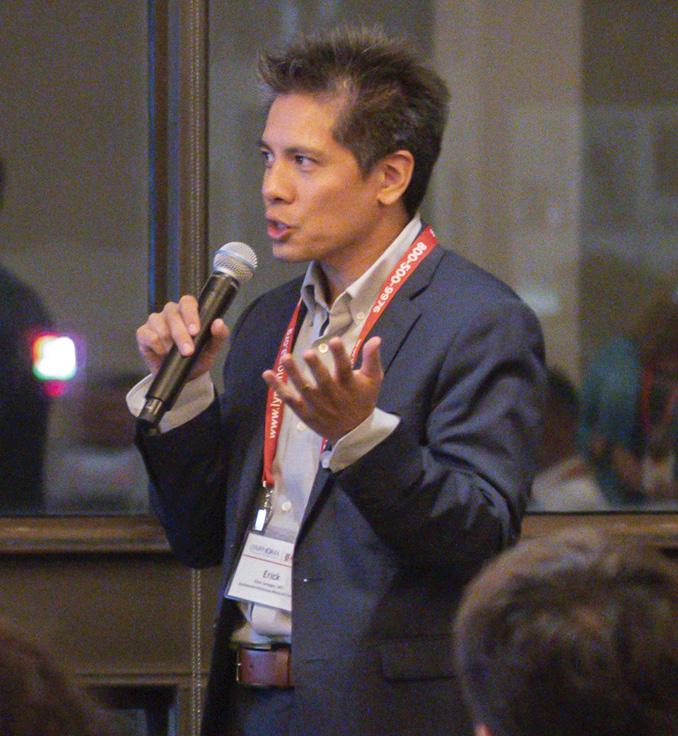
5/8 – Seattle Lymphoma Rounds
5/16 – Los Angeles Lymphoma Rounds
5/23 – Virtual National Lymphoma Rounds
Register for an upcoming Lymphoma Rounds program at lymphoma.org/hcpeducation.
Lymphoma Rounds programming is supported by educational grants from: AbbVie, Inc , Acrotech, Adaptive Biotechnologies, ADC Therapeutics, AstraZeneca, BeiGene, Bristol Myers Squibb, BTG International Inc , Genmab, Kite Pharma Inc , Kyowa Kirin, Lilly, MorphoSys, Pfizer, Pharmacyclics LLC, an AbbVie Company and Janssen Biotech, Inc., administered by Janssen Scientific Affairs, LLC, Seagen
WHERE ARE THEY NOW?
RYAN LYNCH, MD
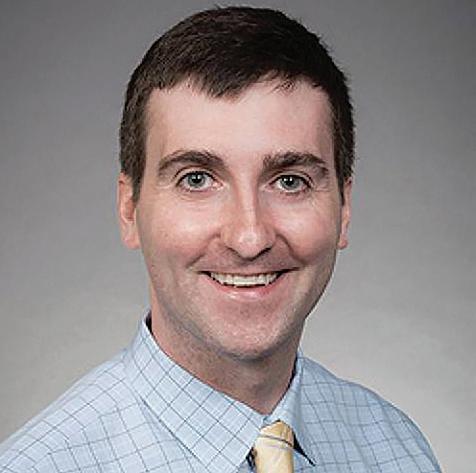
When did you become interested in the study of medicine? In lymphoma specifically?
I had a great opportunity while I was in my residency at Washington University in St. Louis to work on a project examining outcomes of older patients with diffuse large B-cell lymphoma under the mentorship of Dr. Ken Carson. I had further mentorship during my hemeonc fellowship at Stanford working under Dr. Ranjana Advani. While at Stanford, I was able to work with one of the legends of the field, Dr. Saul Rosenberg. While he was among the pioneers in the field who cured the first patients with Hodgkin lymphoma, he recognized the later effects of treatment and spent the later parts of his career investigating less toxic regimens that would still maintain the high cure rates. I also met at Stanford current collaborators, Dr. Ash Alizadeh and Dr. David Kurtz, who have been instrumental in recent years in advancing minimal residual disease testing and non-invasive genotyping in lymphomas.
[ FROM THE FIELD ]
Ryan Lynch is a hematologist-oncologist at Fred Hutchinson Cancer Center. PULSE | WINTER EDITION 2024
Dr.
At what point in your career did you receive funding from the Lymphoma Research Foundation (LRF)?
What kind of grant(s) did you receive?
I was lucky to have great mentorship at my current position at the University of Washington/Fred Hutch Cancer Center. In the summer before I started my first faculty position in 2017, my current mentor, Dr. Ajay Gopal, introduced me to the Lymphoma Research Foundation Mentoring Programs. I was fortunate to get an application together before I even set foot on campus and was accepted into the program in spring 2018. After learning more about LRF through this program, I put together an LRF Career Development Award application in 2019, which was accepted.
What scientific project did you pursue as part of your LRF research grant(s)?
For my mentorship program project, I had designed a clinical trial to add the PI3K inhibitor umbralisib to pembrolizumab for relapsed/refractory classical Hodgkin lymphoma. For my Career Development Award, I investigated better ways to use checkpoint inhibitors, like pembrolizumab, in untreated patients with Hodgkin lymphoma in combination with chemotherapy. Since these drugs can lead to false positive scan results, we also investigated various alternative approaches like metabolic tumor volumes as well as circulating tumor DNA.
How has the treatment landscape for lymphoma/ chronic lymphocytic leukemia (CLL) changed since you first started conducting your research?
For starters, the drug umbralisib that I investigated as my mentorship project (and basically all the other drugs in its class) have been pulled from the market due to safety concerns. Though that project was not fully completed, I did learn about the hope/hype/reality cycle that has repeated itself in recent years with various drug classes. Overall, we have been introduced to countless new treatment modalities in even the short time that I have been doing lymphoma research. The challenge for myself and others in the field is to learn how to better optimize their use to maximize safety and efficacy.
Was the support and grant funding you received from LRF vital to advancing/dedicating your career to studying lymphoma?
The funding and networking provided by LRF and these grants were pivotal at an important time in my career. These awards provided mentorship and stability to allow my career to advance.
LRF has a unique and important role in the lymphoma community. There is no other organization with the size and scope to connect such broad areas in the field, including clinicians, public health scientists, and bench researchers, in both the adult and pediatric communities.
There has been much progress made in the use of checkpoint inhibitors for lymphoma/CLL. Can you describe your work in this area? Do these advancements represent a new frontier in the treatment of lymphoma/CLL?
Our work with checkpoint inhibitors in Hodgkin lymphoma and ctDNA-based minimal residual disease has foreshadowed new frontiers in the management of these patients. We have shown that ctDNA is perhaps a better tool than PET scans for response assessments in this setting. At this point I believe we have the tools to better identify early treatment success and failure, which can then be leveraged to better personalize therapy for these patients.
How has your involvement with LRF evolved since being an LRF Scholar?
I have continued to be involved with LRF as opportunities have presented themselves. I am on the steering committee of the Seattle Lymphoma Rounds. I have been involved with an Adolescent and Young Adult workshop in 2022 that helped connect the adult and pediatric oncology communities. I continue to attend other workshops that are relevant to my career and research interests.
“The funding and networking provided by LRF and these grants were pivotal at an important time in my career. These awards provided mentorship and stability to allow my career to advance.”
Continued
on the next page
13
Why is LRF’s mission and focus on lymphoma-specific research and programming important? Put another way: How would the lymphoma community be impacted if there was no LRF?
LRF has a unique and important role in the lymphoma community. There is no other organization with the size and scope to connect such broad areas in the field, including clinicians, public health scientists, and bench researchers, in both the adult and pediatric communities. These types of interactions are extremely important for broadening lymphoma research but don’t happen organically. I also know that the leadership of LRF understands the important challenges and questions of the day and adapts their advocacy and support to meet an ever-evolving field.
What research or projects are you currently pursuing that you would like to share with our readers? What are you most excited about in the field of lymphoma research today? Why?
I am most excited about the hope to better optimize treatments for patients with lymphomas. Historically, this has entailed one-size-fits-all approaches that stemmed from the lack of tools to gauge success (before even CT scans were available). However, despite sensitive PET scans, MRD, and non-invasive genotyping, most treatment algorithms remain fixed. A key focus of my research is to investigate how we can maintain successful treatment outcomes with safer and less toxic therapies. And similarly, how we can identify early and inevitable treatment failure (slow response, high-risk genotype) and adapt therapy in these cases to prevent relapse. I am grateful to be involved in the design of the next-generation studies that hope to answer these questions in both Hodgkin and non-Hodgkin lymphomas.

[ FROM THE FIELD ] PULSE | WINTER EDITION 2024


JOIN US AND TAKE A SWING AT CURING BLOOD CANCER!
2024 LRF South Florida Golf Invitational
La Gorce Country Club
5685 Alton Road
Miami Beach, FL 33140
Host Committee
MONDAY, 2024
Walter Andrews, Barbara Freundlich, Leah & John Leonard, MD, Ryan & Adrienne Moul, MD, Leigh & Cory Olson (Chairs)
Monday, April 15, 2024
9:00 AM Registration and Practice Range
11:30 AM Shotgun Start
4:30 PM Cocktail & Awards Reception
lymphoma.org/SFgolf
2024 LRF Maryland Golf Invitational
TPC Potomac at Avenel Farm
10000 Oaklyn Drive, Potomac, MD 20854
Event Chair
Jim Reid, Consistent Cleaning Service
Monday, June 17, 2024
9:00 AM Registration and Practice Range
11:30 AM Shotgun Start
4:30 PM Cocktail & Awards Reception
lymphoma.org/MarylandGolf
Golfers will enjoy premium gift bags, breakfast, lunch, course refreshments, and a cocktail reception with heavy hors d'oeuvres and prizes!
FOR MORE INFORMATION PLEASE CONTACT FATIMA HAMEED AT EVENTS@LYMPHOMA.ORG
UPDATES FROM 2023 AMERICAN SOCIETY OF HEMATOLOGY ANNUAL MEETING
The Lymphoma Research Foundation (LRF) returned to the American Society of Hematology (ASH) Annual Meeting and Exposition with 318 LRF-affiliated scientists, including past and present members and grantees of LRF’s world-leading Scientific Advisory Board (SAB), contributing to an abstract presented at the conference.
Widely regarded as the premier event in malignant and nonmalignant hematology, the ASH Meeting provides a critical forum for leading hematologists/oncologists to present their findings to over 20,000 of their peers. Among the distinguished scientists attending, more than 100 LRF-affiliated scientists presented at the 2023 ASH Annual Meeting.
In addition to LRF’s representation through presentations, LRF researchers contributed to 859 abstracts across all hematology and 651 lymphoma-related abstracts. About 85% of LRF scholars – participants in LRF’s Lymphoma Scientific Research Mentoring Program (LSRMP) – authored at least one abstract at ASH.
[ FROM THE FIELD ]
PULSE | WINTER EDITION 2024
MRD Status Predicts Progression-free Survival Outcomes in Follicular Lymphoma
The disease course in follicular lymphoma (FL) is highly variable, and it is currently difficult to predict which patients will experience long, durable responses and which will relapse quickly after treatment. Investigators, therefore, sought to determine whether minimal residual disease (MRD) status after initial therapy can be used to predict survival outcomes in patients with advanced stage FL.
This study – presented by LRF grantee, LSRMP faculty member, and speaker for LRF Patient Education Programs Alexey Danilov, MD, of City of Hope – used tissue samples collected during the SWOG S0016 trial, which was performed between 2001 and 2008. Investigators evaluated MRD status from bone marrow biopsies taken one year after the start of treatment (rituximab, cyclophosphamide, doxorubicin, vincristine, prednisone [R-CHOP] or CHOP + I133-tositumomab [CHOP-RIT]). Response and survival rates were then compared between those with undetectable MRD and those with MRD positivity over up to 10 years of follow-up.
Among 116 patients included in the study, 83 achieved undetectable MRD and 33 remained MRD-positive. Compared with those who achieved MRD undetectability, MRD-positive patients were 6.5 times more likely to experience progression of disease within 24 months. After five years, 72% of MRD-undetectable patients remained progression free compared with 30% in the MRD-positive group. Higher rates of progression-free survival (PFS) were seen in the MRD-undetectable group relative to the MRD-positive group regardless of response status. Overall survival at five years was not significantly different between the two groups but was numerically higher in the MRD-undetectable group (96% vs. 81%). At 10 years, 56% of MRD-undetectable and 17% of MRD-positive patients remained progression free.
The researchers noted that this represents the first time that MRD status has been shown to predict long-term PFS outcomes in patients with FL treated with initial chemotherapy, and it suggests that MRD assessment may represent a promising tool for prognostication in FL.
This study also included contributions from LRF SAB members Lisa Rimsza, MD, of Mayo Clinic, Arizona; Sonali Smith, MD, of The University of Chicago; and Jonathan W. Friedberg, MD, MMSc of University of Rochester.
Barriers Identified to the Use of CAR T-cell Therapy in Non-Hodgkin Lymphoma
While chimeric antigen receptor (CAR) T-cell therapy represents a promising treatment option for patients with non-Hodgkin lymphoma (NHL), many community physicians face challenges that make it difficult to employ these therapies in the clinic. To address these challenges, researchers surveyed clinicians and completed auditfeedback sessions to identify areas where support is needed to improve the integration of CAR T-cell therapies in clinical practice. This research was presented by LRF grantee and speaking faculty for LRF Patient Education Programs Manali Kamdar, MD, MBBS, of University of Colorado.
Among 60 healthcare professionals who completed the survey, the most commonly identified barriers to the use of CAR T-cell therapies in patients with NHL were the identification of eligible patients, ability to get approval from insurance companies, and transferring of patients to a CAR T-cell center for infusion. Just 51% of providers indicated that they often or always refer eligible patients for CAR T-cell therapy. More than half of respondents suggested there is a need for improved communication between CAR T-cell centers and oncology clinics.
318 LRF-affiliated scientists, including past and present members and grantees of LRF’s world-leading Scientific Advisory Board (SAB), contributed to an abstract presented at the conference.
For the 55 providers who participated in the auditfeedback sessions, where they had the opportunity to learn from CAR T-cell expert physicians, confidence identifying eligible patients – and managing potential adverse effects of CAR T-cell therapy – increased significantly, and participants were able to outline action plans to achieve improved access to CAR T-cell therapies. After 90 days, follow-up surveys were administered, with 92% of respondents reporting improved communication with CAR T-cell centers and 75% reporting improved identification of eligible patients. Gaining approval from insurance companies remained a top challenge for 33% of respondents.
The researchers suggested that the data from this survey can be used to develop future initiatives to support the integration of CAR T-cell therapies into the care of patients with NHL and improve uptake of these therapies in the clinic.
Continued on the next page 17
Total Lifetime Costs of Treating Chronic Lymphocytic Leukemia are High
Treatment advances in chronic lymphocytic leukemia (CLL) have improved outcomes for people living with this disease. Relapses remain common, though, and people with CLL often receive multiple lines of costly therapies in their lifetime. In this study, presented by LRF grantee Farrukh Awan, MD, of University of Texas Southwestern Medical Center, researchers aimed to estimate the total lifetime cost of care for patients with CLL living in the United States.
Total cost estimates were based on a variety of factors, including treatment costs, survival and progression outcomes, and in-patient oncology care. Other factors were also considered, including emergency visits and endof-life care.
Using survival data from the literature, researchers estimated that the average time spent in CLL care was about eight years. The majority of that time (six years on average) was spent in first-line treatment, with shorter intervals spent in subsequent lines of therapy. Treatment costs increased across later lines of therapy, from $140,867 per person per year in first-line treatment to an estimated $234,807 per person per year in the fifth line of treatment.
More than 100 LRF-affiliated scientists presented at the 2023 ASH Annual Meeting.
In total, researchers estimated that the total lifetime cost of CLL care in the United States is about $1,142,357. The majority of these costs (about 77%) were related to drug acquisition and administration; inpatient and emergency department visits accounted for about 20% of total costs. High drug costs were primarily driven by the costs of oral targeted therapies, including Bruton tyrosine kinase inhibitors such as ibrutinib and acalabrutinib along with venetoclax.
The researchers concluded that these results demonstrate that there is a financial need for more effective therapies that limit treatment costs and progression into later – and more expensive – lines of therapy.
High Complete Response Rates in High-Risk Relapsed/ Refractory Follicular Lymphoma Treated with Loncastuximab Tesirine
Loncastuximab tesirine is an antibody-drug conjugate that has demonstrated synergistic properties when used in combination with rituximab. Interim results from an ongoing phase 2 study of loncastuximab tesirine plus rituximab in patients with relapsed or refractory high-risk follicular lymphoma (FL) were presented by LRF grantee Juan Pablo Alderuccio, MD, of University of Miami Health System. In this study, high-risk FL was defined based on the progression of disease within 24 months of frontline immunotherapy or a high burden of disease.
At the time results were reported, 26 patients had been enrolled; response data were available for 21 of these patients. Most patients (77%) had advanced stage disease, and 46% demonstrated progression of disease within 24 months of initial immunotherapy. The median number of prior lines of therapy was 1 but ranged from 1 to 6.
Among the 21 patients with an evaluable response, the overall response rate at week 12 was 95.2%, the complete response rate was 66.7%, and the partial response rate was 28.6%. All complete responses were maintained at week 21, and at least 4 of the 6 partial responders improved to a complete response by this time point. With these improvements in response, the investigators reported a complete metabolic response rate of 86% with shortduration loncastuximab tesirine plus rituximab therapy in patients with relapsed/refractory CLL, including those with high-risk disease.
Among 25 patients with available safety data, most adverse events were mild (grade 1 or 2). All toxicities were able to be resolved with supportive care and dose delays.
This study also included contributions from LRF SAB member Izidore Lossos, MD, of University of Miami Health System; former SAB member Craig Moskowitz, MD, of Sylvester Comprehensive Cancer Center; and LRF grantee Jonathan Schatz, MD, of University of Miami.
[ FROM THE FIELD ] ESTIMA TED RANGE 0 K M PULSE | WINTER EDITION 2024
Overall Survival in Mantle Cell Lymphoma Has Improved in the Era of Targeted Therapies
Mantle cell lymphoma (MCL) has historically been treated using combination chemoimmunotherapy followed by stem cell transplant and has been associated with poor survival outcomes. Within the last decade, a variety of targeted therapies have emerged for the treatment of MCL that have been shown to improve progression-free survival. The benefits of many of these therapies on overall survival (OS), however, has not been described. Investigators, therefore, sought to compare real-world OS outcomes in MCL across eras of treatment, including before and after the introduction of targeted therapies.
Within the last decade, a variety of targeted therapies have emerged for the treatment of MCL that have been shown to improve progression-free survival.
LRF grantee Daniel Ermann, MD, of the University of Utah was one of the main contributing investigators in this study. Results were presented by LRF grantee Boyu Hu, MD, of the University of Utah.
Using data from the National Cancer Database, the investigators compared survival outcomes for more than 31,800 patients with MCL from 2004 to 2020. Those diagnosed from 2004 to 2013 were considered to be managed in the chemoimmunotherapy era; those diagnosed after 2014 were associated with the introduction of targeted therapies, including Bruton’s tyrosine kinase (BTK) inhibitors. Those diagnosed after 2017 were also associated with the introduction of rituximab maintenance therapy.
Among patients diagnosed from 2004 to 2013, the median OS was 5.5 years; median OS was 6.8 years among those diagnosed from 2014 to 2016; and median was not reached for those diagnosed after 2017. Median 1-, 3-, and 5-year OS rates increased across these intervals as well but remained stable in the post-2017 era. After accounting for other factors such as age and comorbidity burden, the risk for death during follow-up decreased for patients diagnosed from 2014 to 2016 by 19% compared with those diagnosed from 2004 to 2013.
The investigators concluded that real-world data demonstrate that survival with MCL has been improved in recent years, which they attribute to the introduction of novel agents such as BTK inhibitors. They noted that additional improvements in OS were not observed following the introduction of rituximab maintenance therapy and suggest this may be related to low rates of stem cell transplant across all time periods evaluated. However, they also noted that more follow-up data are needed to determine the effects of newer therapies, such as CAR T-cell therapies, which were not available during the periods studied.
This study also included contributions from LRF grantees Harsh Shah, DO, of The University of Utah and Deborah Stephens, DO, of The University of North Carolina, Chapel Hill
Durable Responses Observed with Valemetostat
Tosylate Treatment in Relapsed/Refractory Peripheral T-cell Lymphoma
Treatment options for relapsed or refractory peripheral T-cell lymphoma (PTCL) are limited, and many patients experience an aggressive disease course. In the phase 2 VALENTINE-PTCL01 study, the safety and efficacy of the novel drug valemetostat tosylate – approved for the treatment of relapsed/refractory adult T-cell leukemia/ lymphoma (ATLL) in Japan – was investigated in patients with relapsed/refractory PTCL. Primary results from this study were presented by LRF Scientific Advisory Board member Steven Horwitz, MD, of Memorial Sloan Kettering Cancer Center.
Patients in the VALENTINE-PTCL01 study had received a median 2 prior lines of therapy (range, 1 to 12). The median duration of treatment in the study was 18 weeks, with a median follow-up of 10.5 months. At the time of analysis, 24.1% of patients were still receiving treatment, 34.6% discontinued treatment due to disease progression or relapse, and 9.8% discontinued due to adverse events. Other reasons for treatment discontinuation were clinical progression (14.3%) and progression to allogeneic stem cell transplant (9.0%).
Among 119 patients evaluated in the study, the overall response rate was 43.7%, with 17 patients (14.3%) achieving a complete response and 35 (29.4%) achieving a partial response. Overall response rate was similar across all PTCL subtypes observed. The median duration of response was 11.9 months. Median progression-free and overall survival were 5.5 months and 17.0 months, respectively.
Continued on the next page 19
The most common treatment-emergent adverse events in the study were cytopenias, with thrombocytopenia representing the most common overall and grade ≥3 adverse events. Serious adverse events occurred in 39.8% of patients, and 65.4% of patients experienced an adverse event leading to a dose reduction or interruption.
This study also included contributions from Philadelphia Lymphoma Rounds Steering Committee member Stefan Barta, MD, MRCP, MS, of University of Pennsylvania and LRF grantee Neha Mehta-Shah, MD, of Washington University in St. Louis.
Durable Responses Observed with Valemetostat Improved Outcomes in Second-Line Treatment of Large B-Cell Lymphoma in the Era of CAR T-Cell Therapies
The treatment landscape of large B-cell lymphomas (LBCL) has changed dramatically in recent years, driven in part by the emergence of chimeric antigen receptor (CAR) T-cell therapies. To understand how these drugs have changed survival in patients with LBCL, investigators analyzed outcomes from the Lymphoma Epidemiology of Outcomes (LEO) Consortium for Real World Evidence (CReWE) study among participants with relapsed/ refractory LBCL in the second-line treatment setting. LRF grantee Jean L. Koff, MD, MSc, of Winship Cancer Institute was one of the main contributing investigators in this study. Results were presented by LRF Scientific Advisory Board member Loretta Nastoupil, MD, of The University of Texas MD Anderson Cancer Center.
Data for 1,523 patients who received second-line therapy between 2002 and 2022 were included in the analysis. From 2002 to 2010, before CAR T-cell therapies were available, 9% of patients received second-line therapy in a clinical trial setting. That number rose to 13% in the era of CAR T-cell clinical trials (2011 to 2017) and 17% following the approval of CAR T-cell therapies in the third-line setting and beyond. In total, 0.6% of patients from 2011 to 2017 and 13% of those from 2018 to 2022 received second-line CAR T-cell therapy.
Among patients treated from 2002 to 2010, the 24-month event-free survival rate was 22%; this increased to 28% among those treated following the emergence of investigational CAR T-cell therapies. Among patients who received a second-line CAR T-cell therapy in clinical trials from 2011 to 2017, the 24-month event-free survival rate was 50%. The 24-month overall survival rate increased over these intervals as well, particularly for those who received investigational CAR T-cell therapy. From 2011 to 2017, the 24-month overall survival rate was 47% among all patients and 75% among those who received CAR T-cell therapy.
LRF researchers contributed to 859 abstracts across all hematology and 651 lymphoma-related abstracts.
Survival rates in the second-line setting were similar from 2018 to 2022 to the previous era (2011 to 2017), despite an increase in the number of patients receiving secondline CAR T-cell therapy. The investigators noted that additional analyses of factors associated with improved survival in these eras is still ongoing.
This study also included contributions from LRF SAB members James Cerhan, MD, PhD, of Mayo Clinic, Rochester; Christopher Flowers, MD, MS, of MD Anderson Cancer Center; Thomas Habermann, MD, of Mayo Clinic, Rochester; Brad Kahl, MD, of Washington University School of Medicine; Izidore Lossos, MD, of University of Miami Health System; Peter Martin, MD, of Weill Cornell Medicine; former SAB member Brian Link, MD, of University of Iowa Carver College of Medicine; and LRF grantees Carla Casulo, MD, of University of Rochester Medical Center; Dai Chihara, MD, PhD, of MD Anderson Cancer Center; Jonathon B. Cohen, MD, MS, of Winship Cancer Institute; Arushi Khurana, MBBS, of Mayo Clinic, Rochester; and Matthew Maurer, D.M.Sc, of Mayo Clinic, Rochester.
Increased Metabolism in High IRF4-Expressing Lymphoma Cells Limits the Availability of Glucose in the Tumor Microenvironment
Cancer cells routinely reprogram cellular metabolism to improve their fitness, providing a selective advantage that supports growth and expansion. Researchers previously determined that increased expression of the protein IRF4 is associated with altered immune signaling and an immunosuppressive tumor microenvironment in follicular lymphoma (FL), which collectively correlate with poor prognosis. In the present study, presented by LRF grantee Patrizia Mondello, MD, PhD, MSc, of Mayo Clinic, Rochester, investigators aimed to determine whether this metabolic reprogramming was directly responsible for the suppression of immune activity in the tumor microenvironment, which may represent an opportunity to identify novel therapeutic targets in FL.
[ FROM THE FIELD ] PULSE | WINTER EDITION 2024
To this end, the investigators performed a series of experiments involving lymphoma cell lines with varying levels of IRF4 expression. They found that cells expressing high levels of IRF4 have increased levels of glucose uptake, and that glucose levels are low in the media in which these cells are cultured. Glucose levels within the environment can influence the growth of immune cells (CD4+ T cells), which also require these molecules as an energy source. The investigators found that when IRF4 activity was suppressed, glucose concentrations in the environment were high, which correlated with an increase in the abundance of immune T cells.
The researchers concluded that glucose levels in the tumor microenvironment serve as fuel for the survival and function of immune cells, and that increased expression of IRF4 expression in lymphoma cells rewires the metabolic properties of cancer cells such that available glucose becomes limited. They suggest that cellular mechanisms involved in glucose metabolism may therefore represent a vulnerability within cancer cells that can be exploited for the development of novel therapeutic strategies.
About 85% of LRF scholars – participants in LRF’s Lymphoma Scientific Research Mentoring Program (LSRMP) – authored at least one abstract at ASH.
This study also included contributions from LRF SAB members Stephen Ansell, MD, PhD, of Mayo Clinic, Rochester; Laura Pasqualucci, MD, of Columbia University; and LRF grantee Anne J. Novak, PhD, of Mayo Clinic, Rochester.
21

UPDATES FROM THE 2023

AMERICAN SOCIETY OF HEMATOLOGY ANNUAL MEETING WEBINAR
Want to learn more about pivotal lymphoma research presented at the 2023 American Society of Hematology (ASH) Annual Meeting? View the 2023 ASH webinar on demand at lymphoma.org/webinars.




























PULSE | WINTER EDITION 2024

PATIENT EDUCATION PROGRAMS



Education Programs:

2 29


3.6
3.13
3.16
3.28 Virtual
4.6
The Lymphoma Research Foundation (LRF) hosts more than 50 free patient education programs each year to provide members of the lymphoma community with up-to-date information about lymphoma and treatment options. T These patient education programs hosted include Ask the Doctor About Lymphoma, Lymphoma Workshops, Webinars and the North American Educational Forum on Lymphoma, for people with lymphoma and their loved ones.
Whether you are newly diagnosed, want detailed information about your lymphoma subtype, are looking for ongoing support, or seeking help with long-term survivorship, LRF is here to help.
Visit lymphoma.org/programs to register and learn more.
Virtual Ask the Doctor: Navigating an Ultra-Rare Lymphoma Diagnosis
Virtual Ask the Doctor: Information for Relapsed/Refractory Patients
What to Know About Minimal Residual Disease Webinar
Spring Lymphoma Workshop
Virtual
Ask the Doctor: Information on Treatment Options and Clinical Trials
Lymphoma Workshop
Midwest
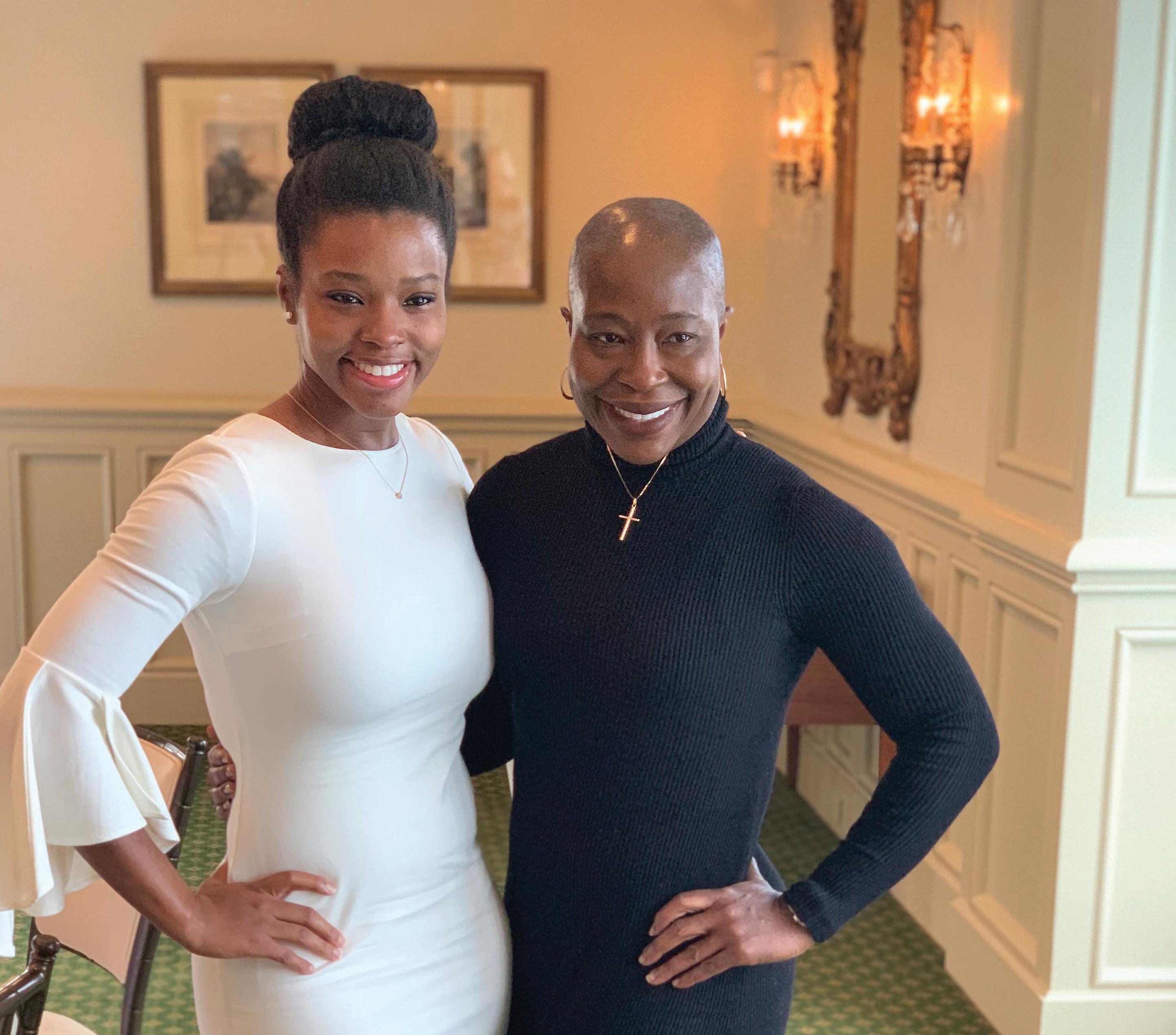
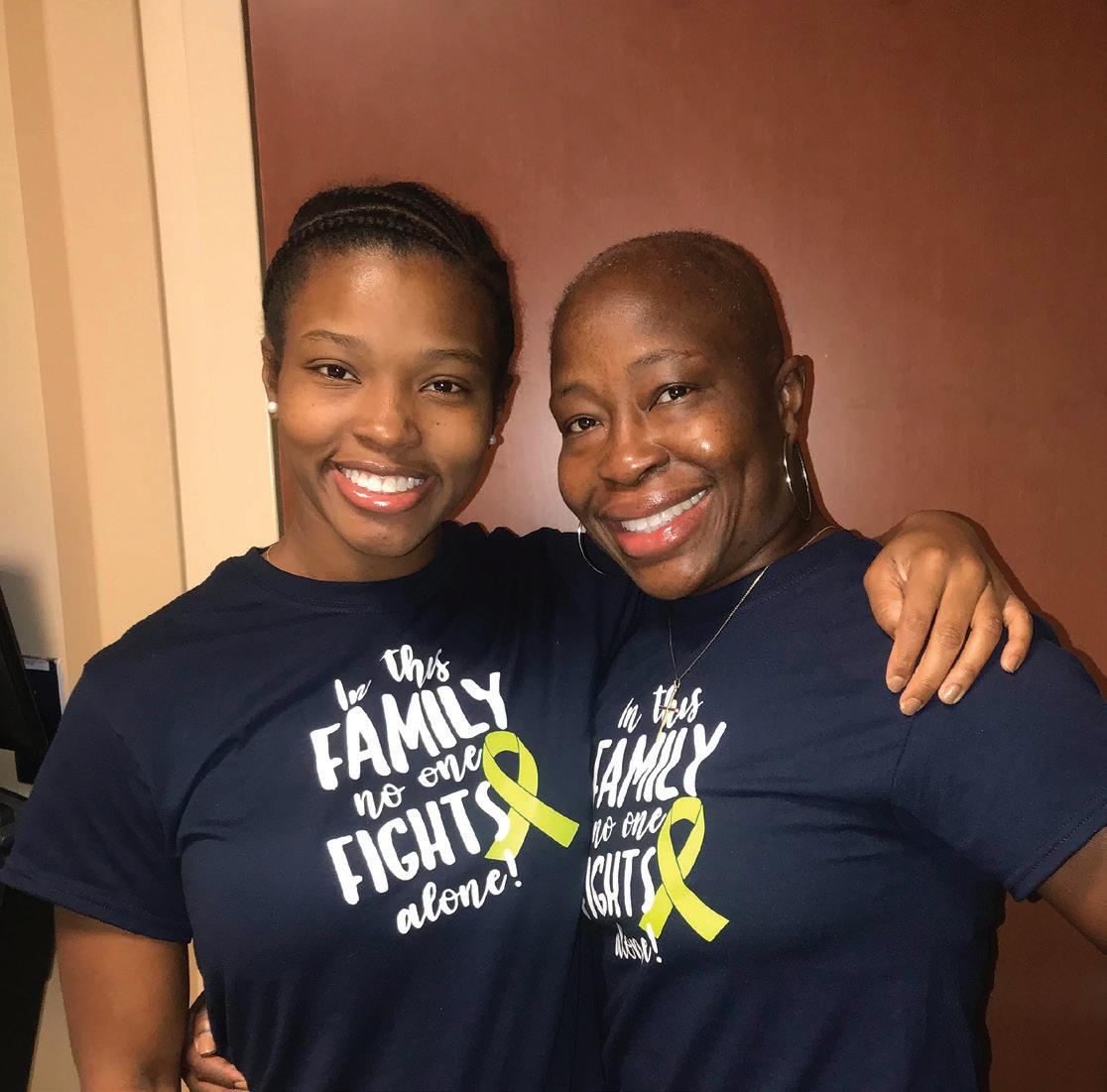
‘CHEMO DIVA’
Upon receiving a lymphoma diagnosis, it’s not uncommon to search for others like you who are going through a similar experience. That sense of community and support, of seeing your own story reflected back to you, can provide much needed encouragement and help you feel less alone.
But what if you can’t easily find a community with stories of people who look like you? If you’re Tatiana Tate, founder of Chemo Divas Foundation, you create your own.
Tatiana, a 30-year-old Black accounting professional based in Connecticut, started Chemo Divas Foundation in 2022 after witnessing the disparities in our health care system throughout her mother’s 16-month lymphoma journey.
PULSE | WINTER EDITION 2024
Tatiana’s mother, Paulette Ann Steeves, was first diagnosed with Stage II HTLV-1 associated adult T-cell leukemia/lymphoma (ATLL) in October of 2019 at age 48. An active body builder and runner, Paulette was in the best shape of her life when she was diagnosed, and she was determined not to let lymphoma take away her love of living. Tatiana was just 26 at the time, recently married, and building a life with her husband.
“My mom had always been my brother Elijah’s and my rock growing up – she was always there for us. So when I picked up the phone at work one day and she told me that she had lymphoma, I froze and fell to the floor – I couldn’t stop crying,” said Tatiana. “I had never had a panic attack before, but I had one that day. I knew from that moment on that I was 100% committed to being there for my mom the way she was always there for us.”
Like many people first diagnosed with a serious illness, Tatiana and her mother found themselves thrown into an unfamiliar health care system and a steep learning curve about caregiving and Paulette’s rare lymphoma type. In their research, they learned that ATLL is a rare and often aggressive form of T-cell lymphoma that can be found in the blood (leukemia), lymph nodes (lymphoma), skin, or multiple areas of the body. ATLL has been linked to a virus (human T-lymphotropic virus type 1 [HTLV-1], often found in people from the Caribbean, parts of Japan,
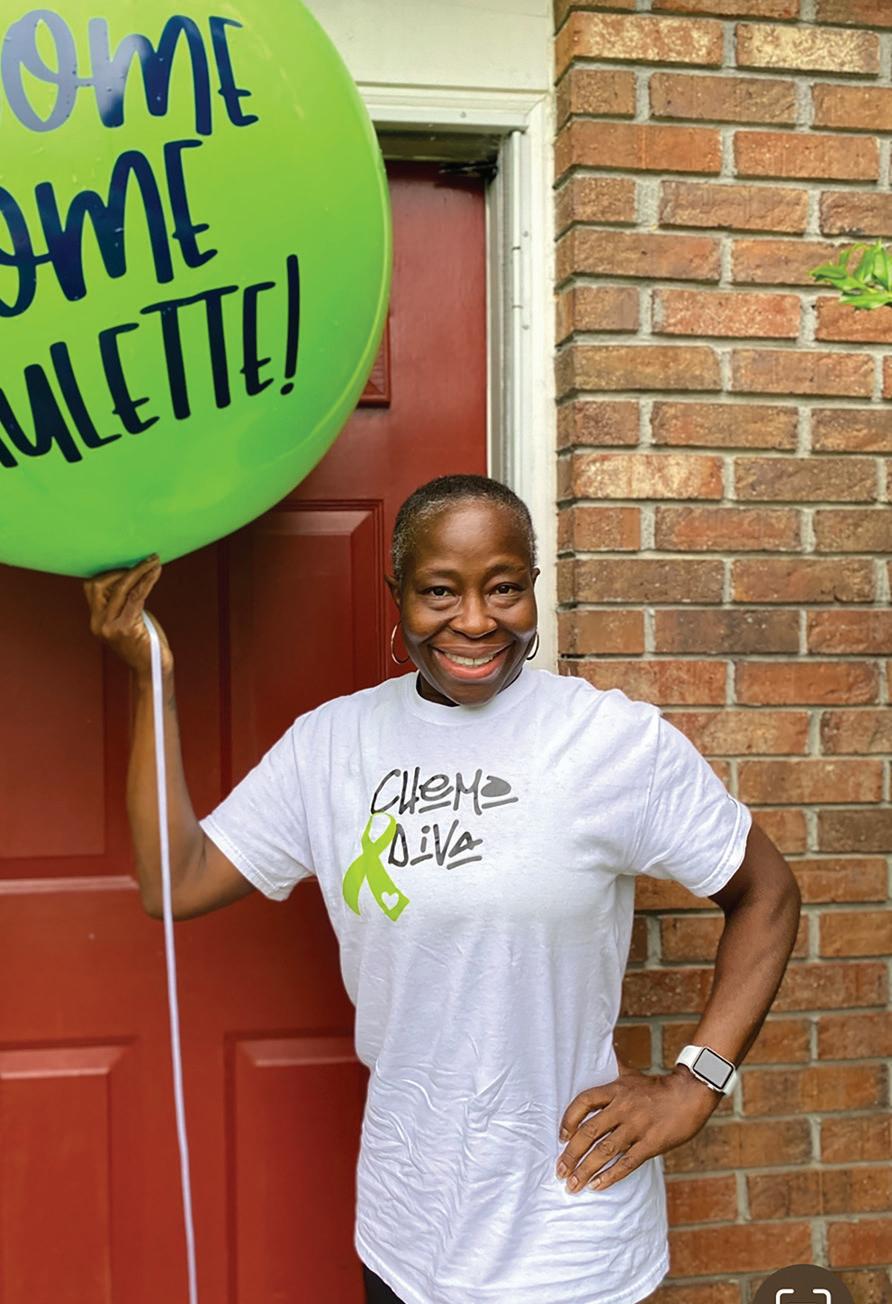
and some areas of South and Central America and Africa. Less than 5% of those carrying the virus will develop lymphoma, but those who do require immediate treatment due to the aggressive nature of the disease.
“Initially, the vocabulary around lymphoma felt so foreign to us, and there were times when we were made to feel less than by medical professionals, but my mom was always so positive throughout everything, which is a testament to her spirit,” said Tatiana. “One of the first things she said after being diagnosed and starting chemotherapy treatment was that if she had cancer and had to undergo chemotherapy, she was going to be a ‘Chemo Diva.’ It stuck, and before long, her friends were sending her T-shirts with ‘Chemo Diva’ across the front. She would arrive at her chemo appointments and announce to the front desk that ‘The Chemo Diva is here!’”

“One of the first things she said after being diagnosed and starting chemotherapy treatment was that if she had cancer and had to undergo chemotherapy, she was going to be a ‘Chemo Diva.’”

Continued on the next page 25
Out of Hardship, an Inspiration
Tatiana accompanied her mom to six different hospitals around the country as she attempted over 10 different treatments, including chemotherapy, radiation, and clinical trial immunotherapy, helping her mom keep that same light spirit along the way. During those trials, the COVID pandemic made treatment even more challenging, and Tatiana was not allowed to stay with her mom in the hospital due to safety protocols. To let her mom know that she was thinking about her, Tatiana turned to Instagram to find inspirational and humorous posts for her mom. The only trouble was that she couldn’t easily find many stories of women of color sharing their cancer journeys.
“Initially, I had a hard time finding relatable content – nobody looked like us,” said Tatiana. “So I decided to create the Chemo Divas Instagram page to celebrate women of color like my mom who faced cancer with humor, courage, personality, and flair; women who may be going through a difficult time healthwise, but who are choosing to find the fun in life even in those tough times. Over time, the page became a community and a place to show my mom and me doing TikTok dances together and our day-to-day lives as patient and caregiver.”
“Initially, I had a hard time finding relatable content — nobody looked like us,” said Tatiana. “So I decided to create the Chemo Divas Instagram page to celebrate women of color like my mom who faced cancer with humor, courage, personality, and flair; women who may be going through a difficult time healthwise, but who are choosing to find the fun in life even in those tough times.”
Beyond championing women of color facing their cancer diagnoses head on, Chemo Divas quickly became a healthy distraction from the challenges that Paulette and Tatiana were going through.
“When you’re in clinical trials, you spend a lot of time waiting on a phone call with results or waiting for a call from your doctor,” said Tatiana. “Instead of just staring at our phones all day, my mom and I would practice our dance moves and create new content for Chemo Divas to keep our minds off all the waiting.”
A Lasting Tribute to a Life Well Lived
Unfortunately, Paulette passed away in March of 2021, 16 months after being diagnosed, but Tatiana has kept Chemo Divas going in her honor so that no woman of color will have to face a cancer diagnosis alone. Now, an official nonprofit foundation, Chemo Divas has more than 300 Instagram posts and nearly 2,000 followers who rely on the content for hope, community, resources, or a quick pick-me-up. To date, the organization has distributed $52,000 in financial aid to women of color and their caregivers. Chemo Divas’ goal is to improve health equity for women of color impacted by cancer. The organization shares resources, financial support, and the cancer journeys of women of color to provide support for others facing a cancer diagnosis.
Tatiana recently became involved with the Lymphoma Research Foundation (LRF) and found support for her mission in advancing health equity, which is one of LRF’s key initiatives aimed at removing barriers so that everyone has access to quality healthcare.
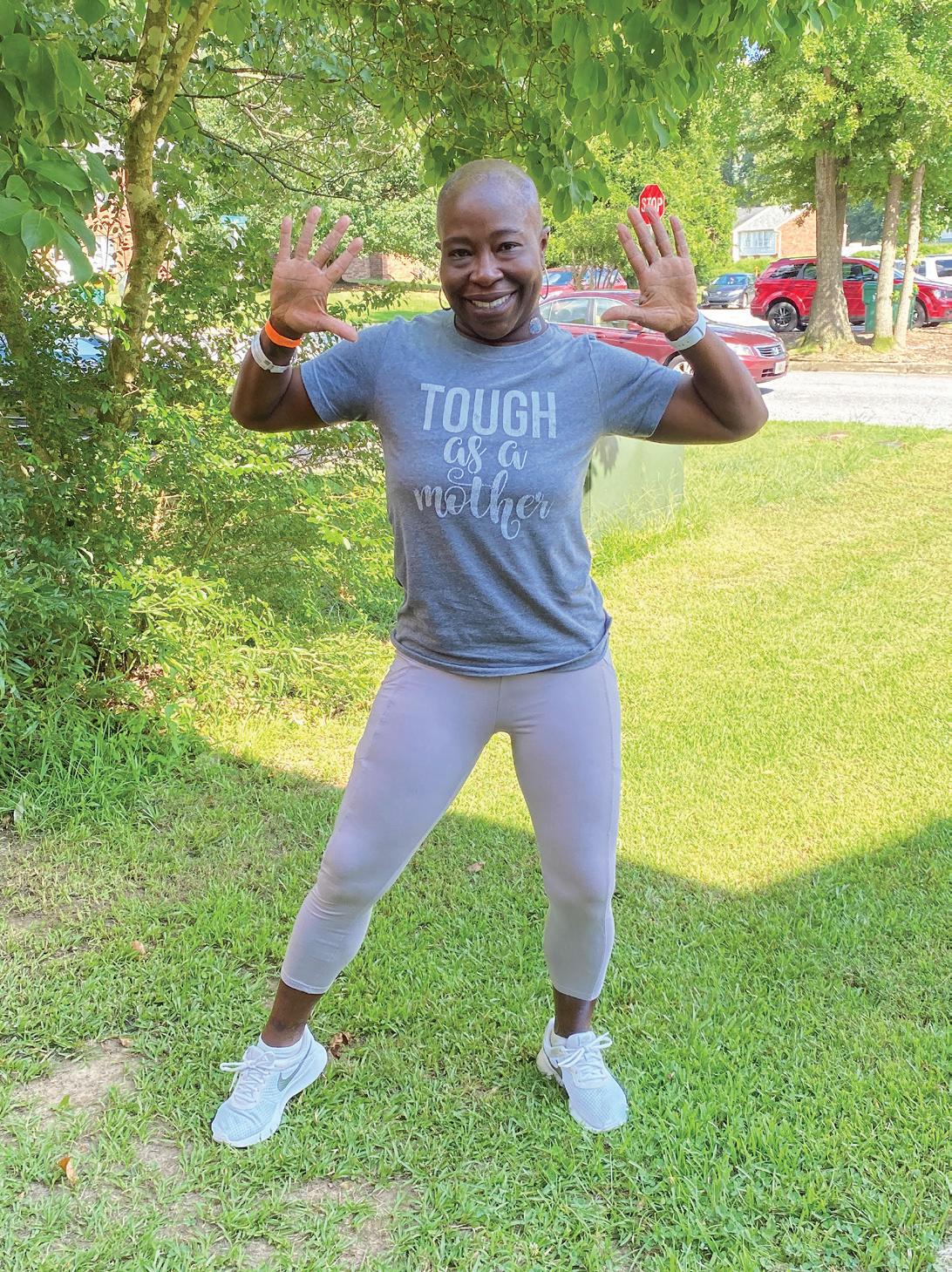
[ LIVING WITH LYMPHOMA ]
PULSE | WINTER EDITION 2024
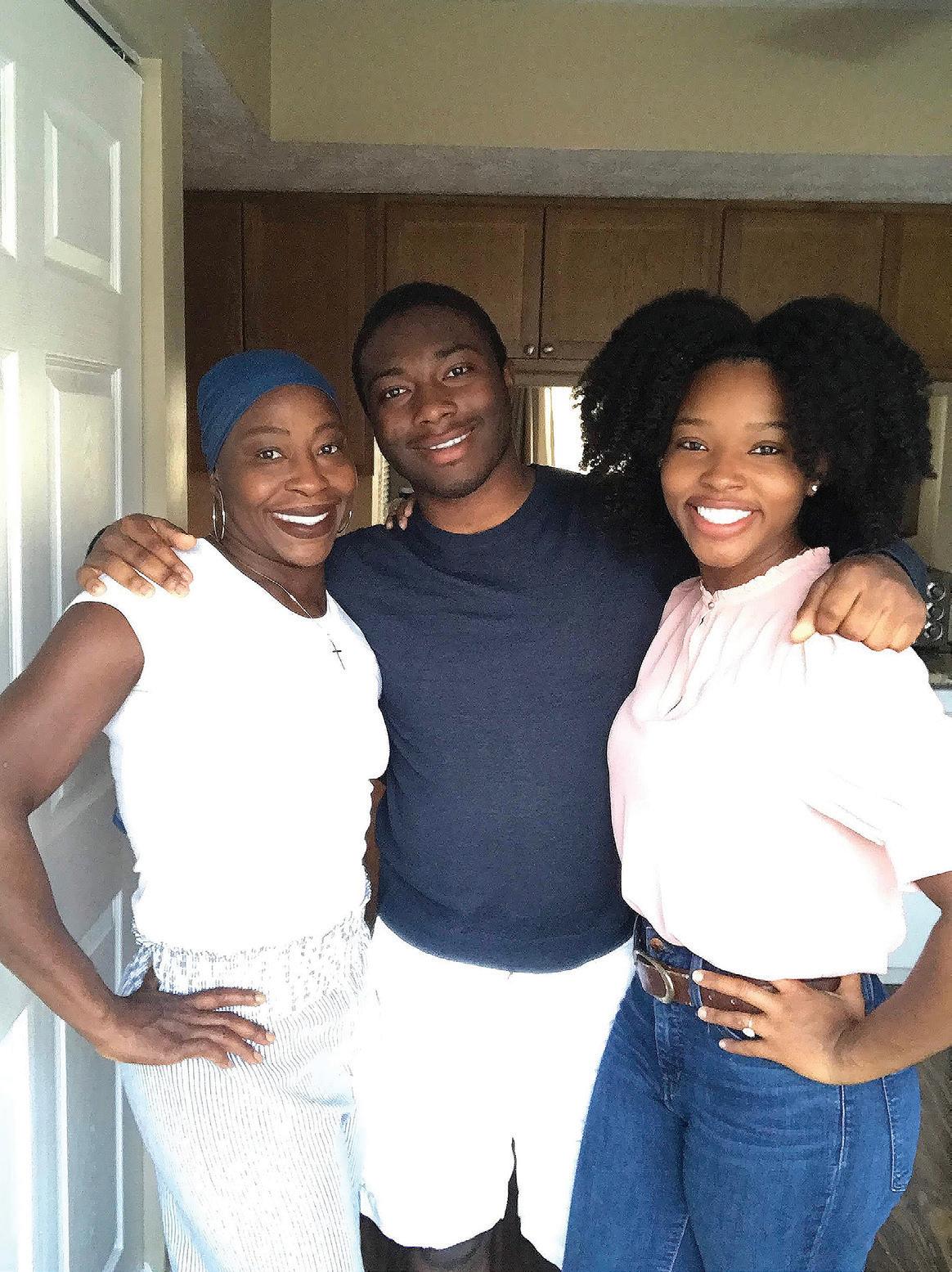
“There were times when my mom would have to go into the hospital, and even though I couldn’t stay with her in person, I could create an Instagram post sharing another woman’s story with my mom so that she knew I was right there with her in spirit. Through our Chemo Divas page, and now the Chemo Divas Foundation, my mom wound up talking with so many other women facing a similar diagnosis – whether it was blood cancer or not. Chemo Divas helped my mom and me feel less alone, giving us a purpose bigger than ourselves in sharing the joy of our day-to-day experiences with others who need it.”
Tatiana’s long-term goal for Chemo Divas is for the organization to be a trusted source of information and support for women of color as they navigate cancer care.
“I’ve spoken with other women of color who have told me that when they asked their social worker, doctor, or medical team if there were organizations out there for women of their background, they were told ‘no,’ and Chemo Divas is proof of that simply not being true,” said Tatiana. “Like LRF, Chemo Divas is giving young women of color a voice and a sense of community, and that goes a long way to building awareness and creating positive change.”
“I’ve spoken with other women of color who have told me that when they asked their social worker, doctor, or medical team if there were organizations out there for women of their background, they were told ‘no,’ and Chemo Divas is proof of that simply not being true, said Tatiana. “Like LRF, Chemo Divas is giving young women of color a voice and a sense of community, and that goes a long way to building awareness and creating positive change.”
To learn more about Chemo Divas Foundation and how you can help support their mission, visit ChemoDivas.org.
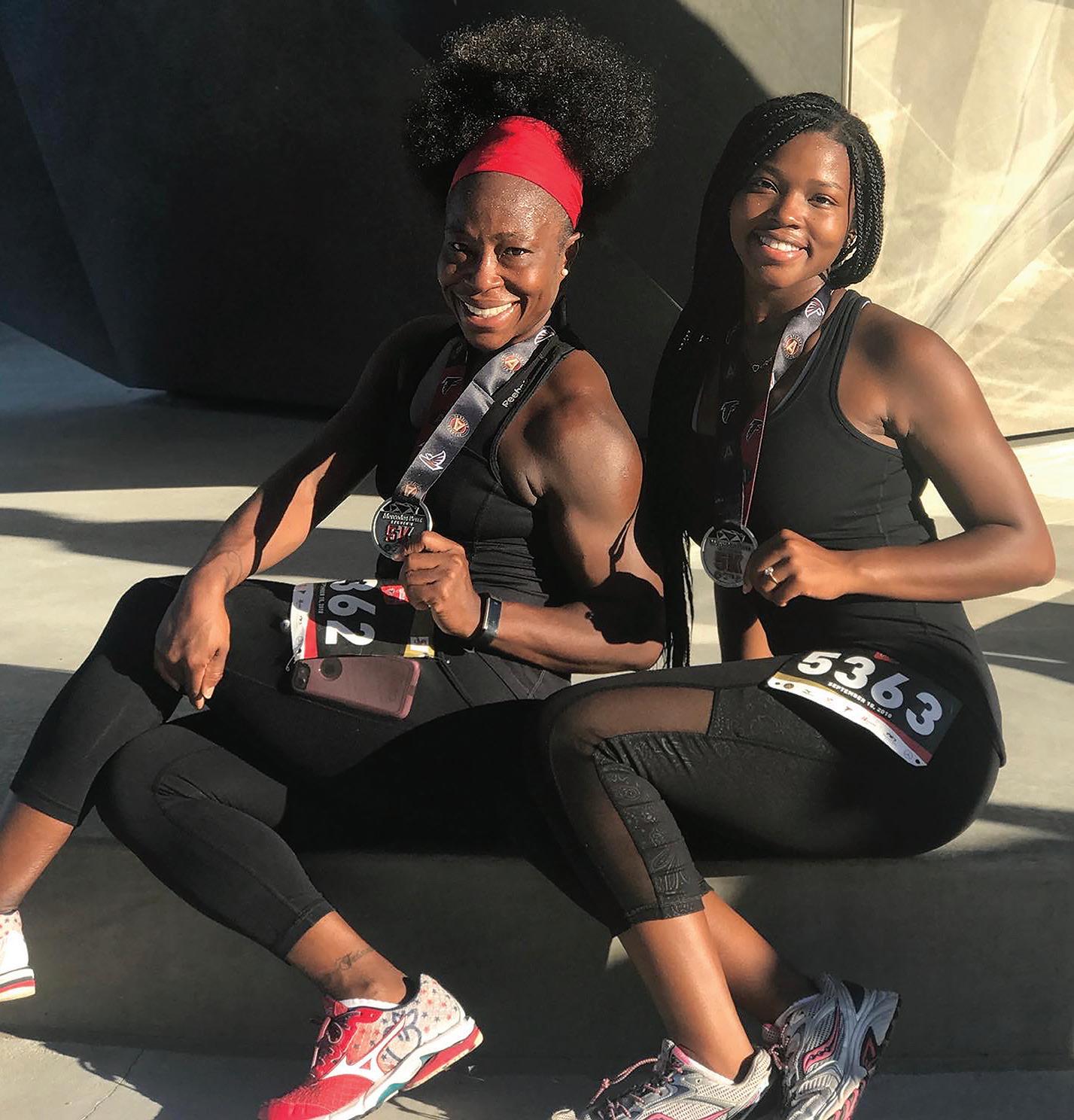
27
SCIENTIFIC ADVISORY BOARD
The Lymphoma Research Foundation’s volunteer Scientific Advisory Board, comprised of 45 world-renowned lymphoma experts, guides the Foundation’s research activities, seeking out the most innovative and promising lymphoma research projects for support.
2023-2024 MEMBERSHIP
ANN S. LACASCE, MD, MMSC
Chair
Harvard Medical School
Dana-Farber Cancer Institute
ANDREW M. EVENS, DO, MSC, FACP Chair-Elect
Rutgers Cancer Institute of New Jersey
RANJANA ADVANI, MD Stanford University School of Medicine
ASH A. ALIZADEH, MD, PhD Stanford University School of Medicine
STEPHEN ANSELL, MD, PhD Mayo Clinic, Rochester
KRISTIE A. BLUM, MD
Winship Cancer Institute of Emory University
JENNIFER BROWN, MD
Dana-Farber Cancer Institute
JAMES CERHAN, MD, PhD Mayo Clinic, Rochester
ETHEL CESARMAN, MD, PhD
NewYork-Presbyterian Hospital
Weill Cornell Medicine
SANDEEP DAVE, MD, MS Duke University
KIERON M. DUNLEAVY, MD
Lombardi Cancer Center of Georgetown University
KOJO S.J. ELENITOBA-JOHNSON, MD
Memorial Sloan Kettering Cancer Center
CHRISTOPHER R. FLOWERS, MD, MS
The University of Texas MD Anderson Cancer Center
JONATHAN W. FRIEDBERG, MD, MMSc
University of Rochester
James P. Wilmot Cancer Institute
LEO I. GORDON, MD, FACP
Past Chair, 2015-2017
Robert H. Lurie Comprehensive Cancer Center of Northwestern University
MICHAEL GREEN, MD, PhD
The University of Texas MD Anderson Cancer Center
THOMAS M. HABERMANN, MD
Past Chair, 2017-2019 Mayo Clinic, Rochester
STEVEN M. HORWITZ, MD
Memorial Sloan Kettering Cancer Center
ERIC D. HSI, MD
Mayo Clinic, Rochester
BRAD S. KAHL, MD
Washington University School of Medicine
KARA KELLY, MD
Roswell Park Comprehensive Cancer Center University at Buffalo Jacobs School of Medicine
JOHN P. LEONARD, MD
Past Chair, 2012-2015
NewYork-Presbyterian Hospital
Weill Cornell Medicine
IZIDORE S. LOSSOS, MD
University of Miami Health System Sylvester Comprehensive Cancer Center
PETER MARTIN, MD
Weill Cornell Medicine
ARI MELNICK, MD
NewYork-Presbyterian Hospital
Weill Cornell Medicine
LINDSAY MORTON, PhD National Cancer Institute
MARKUS MÜSCHEN, MD, PhD
Yale School of Medicine
LORETTA NASTOUPIL, MD
The University of Texas MD Anderson Cancer Center
TERESA PALOMERO, PhD
Institute for Cancer Genetics, Columbia University
LAURA PASQUALUCCI, MD
Institute for Cancer Genetics, Columbia University
BARBARA PRO, MD Columbia University
LISA RIMSZA, MD Mayo Clinic, Arizona
LISA ROTH, MD
Weill Cornell Medicine
KERRY J. SAVAGE, MD
British Columbia Cancer
DAVID SCOTT, MBChB, MD
BC Cancer, Vancouver
LAURIE SEHN, MD, MPH
BC Cancer, Vancouver
MARGARET SHIPP, MD
Harvard Medical School
Dana-Farber Cancer Institute
SONALI M. SMITH, MD
Immediate Past Chair, 2021-2023 The University of Chicago
EDUARDO M. SOTOMAYOR, MD Tampa General Hospital
CHRISTIAN STEIDL, MD BC Cancer, Vancouver
JOHN M. TIMMERMAN, MD
UCLA Jonsson Comprehensive Cancer Center
SVEN de VOS, MD, PhD
UCLA Jonsson Comprehensive Cancer Center
HANS-GUIDO WENDEL, MD
Memorial Sloan Kettering Cancer Center
ANDREW D. ZELENETZ, MD, PhD
Past Chair, 2019-2021
Memorial Sloan Kettering Cancer Center
MEMBERS EMERITUS
MORTON COLEMAN, MD
NewYork-Presbyterian Hospital
Weill Cornell Medicine
BRIAN LINK, MD
University of Iowa
KANTI R. RAI, MD
Donald and Barbara Zucker School of Medicine at Hofstra/Northwell
MICHAEL E. WILLIAMS, MD, ScM
University of Virginia Cancer Center
PULSE | WINTER EDITION 2024


Want to receive information about Lymphoma Research Foundation events happening in your area? Visit lymphoma.org/emailsignup to select your email preferences and stay up to date with the latest from the Foundation.
Rare Disease Day ................................................................. 2.29 Ask the Doctor: Navigating an Ultra-Rare Lymphoma Diagnosis ............................ 2.29 Dallas Lymphoma Walk and Color Run ................................................ 3.3 Ask the Doctor: Information for Relapsed/Refractory Patients ............................. 3.6 San Francisco Lymphoma Rounds .................................................... 3.6 Virtual National Lymphoma Workshop ................................................ 3.16 Philadelphia Lymphoma Rounds ..................................................... 3.21 Chicago Lymphoma Rounds ......................................................... 3.28 Midwest Lymphoma Workshop ...................................................... 4.6 New England Lymphoma Rounds .................................................... 4.11 South Florida Golf Invitational....................................................... 4.15 UPCOMING EVENTS
29
Commit t o your future impact today.
When you include the Lymphoma Research Foundation [LRF] in your estate plan, you are investing in the most promising research that has the greatest potential to dramatically improve the lives of those impacted by lymphoma.
Thank you for ensuring LRF can serve those touched by this disease well into the future and, ultimately, eradicate lymphoma.
To learn more, visit lymphoma.org/legacy


Wall Street Plaza 88 Pine Street, Suite 2400 New York, NY 10005 NONPROFIT ORGANIZATION U.S. POSTAGE PAID NEW YORK, NY PERMIT NO. XXX













 Meghan Gutierrez Chief Executive Officer
Meghan Gutierrez Chief Executive Officer





























































